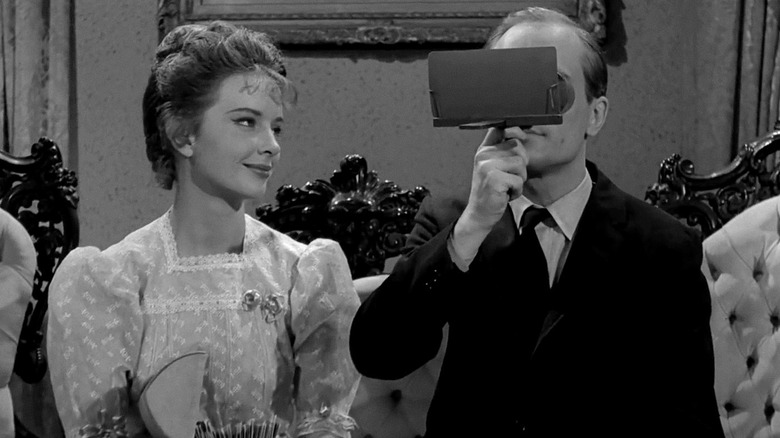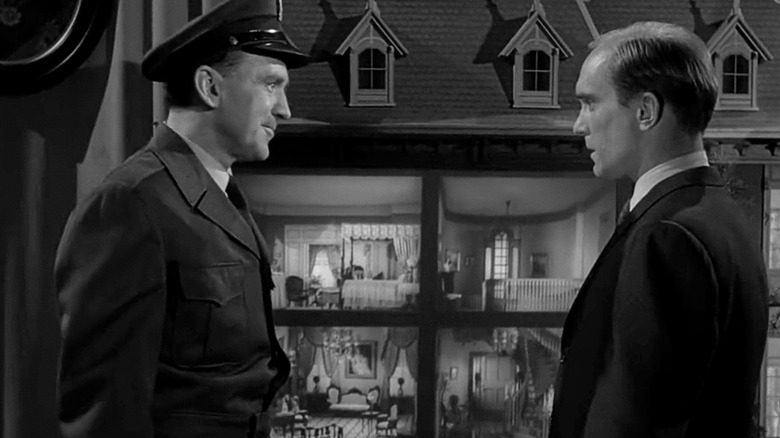A Sue-Happy Scriptwriter Buried This Twilight Zone Episode For Over Two Decades
Despite its unambiguously stellar reputation today, the production of "The Twilight Zone" was filled with constant drama and controversy — some of which revolved around accusations of plagiarism. There were writers like Ray Bradbury who felt that the series was taking too much of its material from previous speculative novels and short stories, and then there were many of the writers who responded to the show's early call for screenplays. 14,000 audience members sent in an episode script, hoping to get their writing produced on the show, and precious few of them were considered readable, let alone good enough to get accepted.
The fact that so many people sent in their own scripts was a problem, because that was 14,000 episode ideas Serling was technically exposed to. If he wrote an episode that even vaguely resembled the basic premise of any of those 14,000 scripts, it's easy to see how any of those writers could've felt ripped off. This whole situation is a big part of why modern authors and screenwriters tend to avoid engaging with any fan fiction based on their work, especially if the work in question is an unfinished series. The moment they start reading a fan's writing, they're opening themselves up to all sorts of potential copyright accusations down the line.
Such was the case with the season 4 episode "Miniature," an episode about an awkward, alienated man who grows obsessed with a mysterious doll house. The doll house starts bringing him far more joy and excitement than anything in his real life, resulting in a conclusion where he turns into a doll himself — framed as a mostly happy ending. It's one of the strongest episodes of the season, but for one screenwriter in the audience, the premise was a little too familiar.
Miniature vs The Thirteenth Mannequin
As explained in "The Twilight Zone Companion," the supposedly plagiarized script was called "The Thirteenth Mannequin," and it did cover some of the same general themes:
"The script concerned an old man who preferred the company of store mannequins — mannequins who ultimately come to life. The suit claimed that since both works dealt with main characters becoming involved with inanimate human figures who come to life, 'Miniature' had stolen the idea."
Ultimately the case was dismissed by a judge and then again on appeal. The reasoning was that not only was "The Miniature" different enough to not be considered stolen from "The Thirteenth Mannequin," but that "The Thirteenth Mannequin" itself was awfully similar to a "Twilight Zone" episode that came out in season 1. "The After Hours," written by Serling, revolved around sentient mannequins. If anything, one could argue that the suing screenwriter stole Serling's idea, not the other way around.
Although Serling escaped the lawsuit with his reputation rightfully intact, the episode itself still suffered a lot for it. Although "Miniature" is available now on streaming services, it was denied syndication for twenty years after its initial airing. In fact, it wasn't available to watch at all until the show's 1984 Silver Anniversary Special.
It's a shame, because "Miniature" is a haunting and thought-provoking episode, one that features a standout performance from a young, pre-fame Robert Duvall. It's also one of the handful of season 4 episodes that fully earned its one-hour time slot — a controversial choice exclusive to this season — using its extra time to add a lot of nuance and sensitivity to its main character's apparent decline into insanity. "Miniature" should have been a well-known classic, one of the show's most popular entries, but instead it was nearly lost to time.

